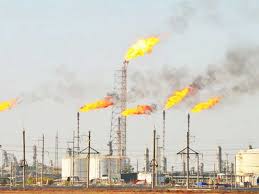Nigeria produced about 1.37 trillion standard cubic feet (scf) of natural gas between January and June 2025, according to fresh data released by the Nigerian Upstream Petroleum Regulatory Commission (NUPRC). The figures show that the country remains heavily dependent on gas for electricity generation, industrial use, and export earnings, despite persistent challenges of flaring, infrastructure gaps, and policy inconsistencies.
The NUPRC report revealed that gas production averaged 229 billion scf per month in the first half of 2025. January recorded the highest output with 236.3 billion scf, while February had the lowest with 199.7 billion scf. Out of the total volume produced, about 1.26 trillion scf, representing 91.8 per cent, was utilised. This included 408.3 billion scf for field use, 370.7 billion scf for domestic supply, and 481.1 billion scf for export markets.
However, the data also highlighted a major setback in Nigeria’s gas utilisation drive, as 101.4 billion scf was flared within the six months. This represents 7.4 per cent of total output. January recorded the highest flaring level of 18.7 billion scf, while February had the lowest at 15.9 billion scf. The commission noted that production figures for April, May, and June remain provisional and would undergo reconciliation in the second quarter.
Industry experts say the numbers reflect both progress and lingering challenges in Nigeria’s gas sector. At the Oriental News Conference in Lagos with the theme “Integrating Nigeria’s Gas Potentials into Strategic Energy Transition Initiatives”, stakeholders called for urgent action to maximise the country’s vast reserves and ensure the ongoing energy transition is tailored to Nigeria’s unique needs.
Temitope Ogedengbe, Manager of Energy Transition at Nigeria LNG (NLNG), warned against copying foreign energy models without adjusting to local realities. He explained that Nigeria must pursue an energy transition strategy that balances economic growth, energy security, and national development. He said the country’s huge gas reserves should be a major asset for affordable and sustainable development if properly harnessed.
Nigeria’s proven gas reserves are estimated at over 200 trillion cubic feet, yet much of it remains untapped due to inconsistent government policies, funding shortfalls, and unpaid debts in the sector. Experts say this untapped wealth could transform the economy, but poor planning has left the industry struggling to meet local demand.
A former Minister of Power, Professor Bart Nnaji, lamented that inadequate investment in gas infrastructure continues to hinder growth in the power sector. He noted that power generation in Nigeria will rely heavily on gas-fired plants for the next two decades, but supply shortages remain a major obstacle. According to him, if government and private investors do not act quickly, the persistent gas shortage will continue to frustrate industrialisation and energy stability.
In her remarks, the Acting Managing Director and Gas Asset Manager of Neconde Energy Limited, Engr. Chichi Emenike, raised concerns about government policies that discourage investment. She pointed out that unpaid gas supplies, dollarised operations, and inconsistent regulations are threatening Nigeria’s energy transition goals. According to her, Neconde has supplied gas to electricity generation companies for almost two years without payment, a situation that discourages further investment and disrupts the value chain.
Analysts say Nigeria’s heavy dependence on gas for electricity and export revenue makes the sector critical to the country’s economic future. While the government has pledged to reduce gas flaring and expand domestic supply, progress has been slow. Stakeholders believe that without urgent reforms and consistent policy implementation, Nigeria risks missing out on the benefits of its gas wealth, particularly in supporting industrial growth and delivering reliable power to millions of households.
The federal government has repeatedly said it is committed to curbing gas flaring and unlocking investment opportunities through its gas expansion policy. But industry players insist that clear policy direction, improved infrastructure, and prompt settlement of debts are the only ways to drive sustainable growth. As Nigeria continues to push for cleaner energy and global competitiveness, the role of natural gas is expected to remain central, but the gap between potential and reality still raises serious concern.
